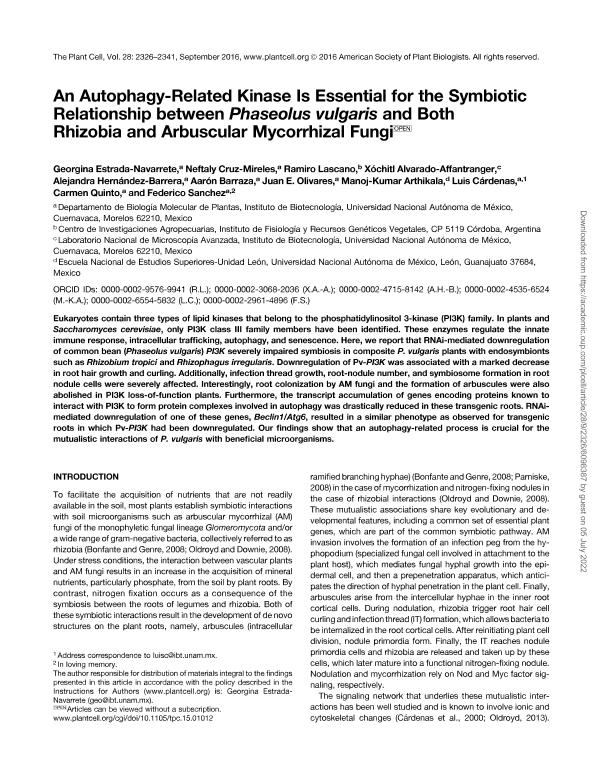Artículo
An autophagy-related kinase is essential for the symbiotic relationship between phaseolus vulgaris and both rhizobia and arbuscular mycorrhizal fungi
Estrada Navarrete, Georgina; Cruz Mireles, Neftaly; Lascano, Hernan Ramiro ; Alvarado Affantranger, Xóchitl; Hernández Barrera, Alejandra; Barraza, Aarón; Olivares, Juan E.; Arthikala, Manoj Kumar; Cárdenas, Luis; Quinto, Carmen; Sanchez, Federico
; Alvarado Affantranger, Xóchitl; Hernández Barrera, Alejandra; Barraza, Aarón; Olivares, Juan E.; Arthikala, Manoj Kumar; Cárdenas, Luis; Quinto, Carmen; Sanchez, Federico
 ; Alvarado Affantranger, Xóchitl; Hernández Barrera, Alejandra; Barraza, Aarón; Olivares, Juan E.; Arthikala, Manoj Kumar; Cárdenas, Luis; Quinto, Carmen; Sanchez, Federico
; Alvarado Affantranger, Xóchitl; Hernández Barrera, Alejandra; Barraza, Aarón; Olivares, Juan E.; Arthikala, Manoj Kumar; Cárdenas, Luis; Quinto, Carmen; Sanchez, Federico
Fecha de publicación:
09/2016
Editorial:
American Society of Plant Biologist
Revista:
Plant Cell
ISSN:
1040-4651
e-ISSN:
1532-298X
Idioma:
Inglés
Tipo de recurso:
Artículo publicado
Clasificación temática:
Resumen
Eukaryotes contain three types of lipid kinases that belong to the phosphatidylinositol 3-kinase (PI3K) family. In plants and Saccharomyces cerevisiae, only PI3K class III family members have been identified. These enzymes regulate the innate immune response, intracellular trafficking, autophagy, and senescence. Here, we report that RNAi-mediated downregulation of common bean (Phaseolus vulgaris) PI3K severely impaired symbiosis in composite P. vulgaris plants with endosymbionts such as Rhizobium tropici and Rhizophagus irregularis. Downregulation of Pv-PI3K was associated with a marked decrease in root hair growth and curling. Additionally, infection thread growth, root-nodule number, and symbiosome formation in root nodule cells were severely affected. Interestingly, root colonization by AM fungi and the formation of arbuscules were also abolished in PI3K loss-of-function plants. Furthermore, the transcript accumulation of genes encoding proteins known to interact with PI3K to form protein complexes involved in autophagy was drastically reduced in these transgenic roots. RNAimediated downregulation of one of these genes, Beclin1/Atg6, resulted in a similar phenotype as observed for transgenic roots in which Pv-PI3K had been downregulated. Our findings show that an autophagy-related process is crucial for the mutualistic interactions of P. vulgaris with beneficial microorganisms.
Archivos asociados
Licencia
Identificadores
Colecciones
Articulos(CCT - CORDOBA)
Articulos de CTRO.CIENTIFICO TECNOL.CONICET - CORDOBA
Articulos de CTRO.CIENTIFICO TECNOL.CONICET - CORDOBA
Citación
Estrada Navarrete, Georgina; Cruz Mireles, Neftaly; Lascano, Hernan Ramiro; Alvarado Affantranger, Xóchitl; Hernández Barrera, Alejandra; et al.; An autophagy-related kinase is essential for the symbiotic relationship between phaseolus vulgaris and both rhizobia and arbuscular mycorrhizal fungi; American Society of Plant Biologist; Plant Cell; 28; 9; 9-2016; 2326-2341
Compartir
Altmétricas



